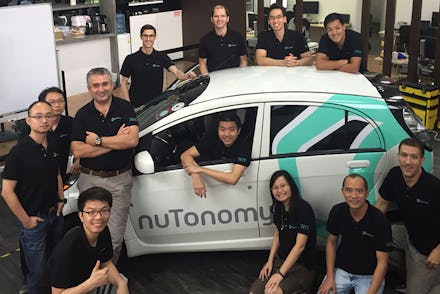When You See These Driverless Taxis, You'll Be Jealous of Singapore

The future of transit is about to arrive — in Singapore.
A startup that spun out of the Massachusetts Institute of Technology is planning to unleash driverless taxis on the city's streets later this year.
The company, nuTonomy, is currently working with Singapore to put self-driving electric taxis within the One North business district to serve as public transportation, according to the MIT News. In the next several years, the company wants to deploy thousands of such cars in Singapore.
The cars are supposed to be able to pick the best routes for both reducing traffic and ferrying passengers. They'll also be relatively cheap.
"This could make car-sharing something that is almost as convenient as having your own private car, but with the accessibility and cost of public transit," nuTonomy CTO Emilio Frazzoli said, according to the MIT News.
NuTonomy's driverless vehicles have already passed their first driving test — a trial involving "navigat[ing] a custom obstacle course, without incident."
Frazzoli co-founded nuTonomy in 2013 as a driverless car consulting service, but in the last year the company has focused more on producing self-driving taxis. Since starting up, the company has raised $3.6 million in funding and taken on contracts with notable car manufacturers like Jaguar Land Rover.
NuTonomy faces big competition from Google, Uber and possibly Tesla — all of which are investing heavily in self-driving cars. While self-driving cars feel like a fast-approaching inevitability, there are still lots of questions to answer before they arrive. Will this technology put taxi and other public transit drivers out of work, for one?
Frazzoli doesn't seem to think so — at least when it comes to Singapore.
"In Singapore, they want to have more buses, but they cannot find people to drive buses at night," he said. "Robotics will not put these people out of jobs — it will provide more capacity and support that's needed."
While it seems driverless cars will initially provide a supplemental role in the transportation economy, eventually they seem headed for a full takeover.